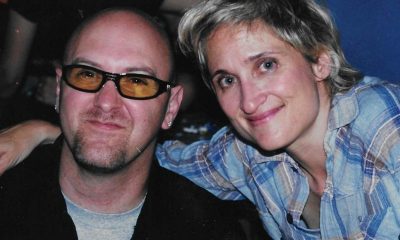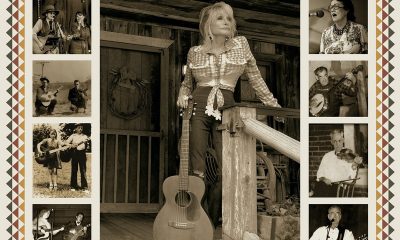Arts & Entertainment
Katy Perry says she would rewrite ‘I Kissed a Girl’ lyrics
the pop star says the song has ‘a couple stereotypes’
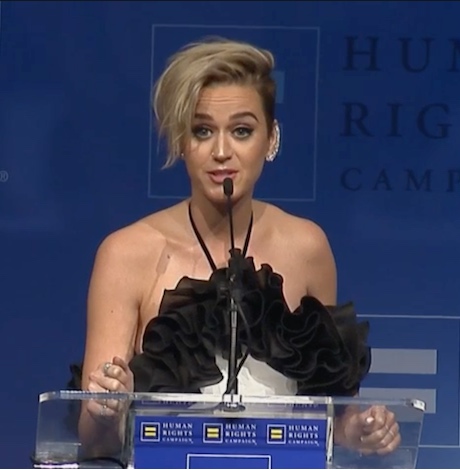
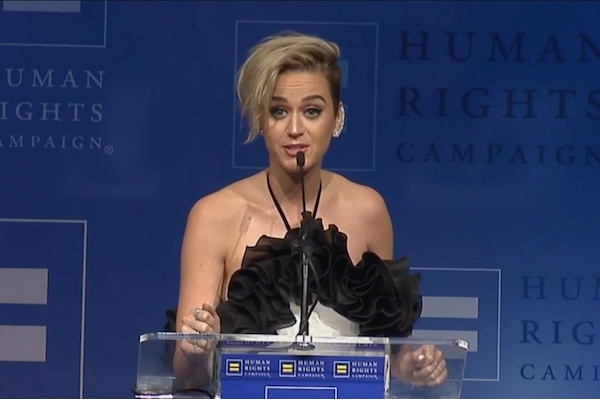
(Screenshot via YouTube.)
Katy Perry says she would rewrite the lyrics to her popular debut 2008 single “I Kissed a Girl” to reflect the changing views on sexuality.
In a video for Glamour, Perry watched fans cover some of her biggest songs. When one fan covers “I Kissed a Girl,” Perry reflects on how the song “has a couple of stereotypes.”
“We’ve really changed, conversationally, in the past 10 years. We’ve come a long way. Bisexuality wasn’t as talked about back then, or any type of fluidity,” Perry says. “If I had to write that song again, I probably would make an edit on it. Lyrically, it has a couple of stereotypes in it. Your mind changes so much in 10 years, and you grow so much. What’s true for you can evolve.”
In 2008, lesbian singer Ditto slammed Perry for the song calling it a “Boner dyke anthem for straight girls who like to turn guys on by making out or, like, faking gay.”
Ditto continued, “She’s [Perry] just riding on the backs of our culture, without having to pay any of the dues and not being actually lesbian or anything at all.”
Last year while accepting the National Equality Award at the Human Rights Campaign gala in Los Angeles, Perry admitted she did “more than” just kiss a girl. Miley Cyrus, who has been friends with Perry for a decade, also claims that she is the cherry-chapstick wearing girl that Perry wrote the song about.
“When she came out with ‘I Kissed a Girl,’ I was doing the ‘Hannah Montana’ movie, and I heard her on the radio, they said, ‘Who’d you write that about?’ And she said me,” Cyrus said.
Watch below.
Movies
Breakthrough queer performance makes for a memorable ‘Kiss’
Tonatiuh brings a sensitivity that illuminates other elements around him
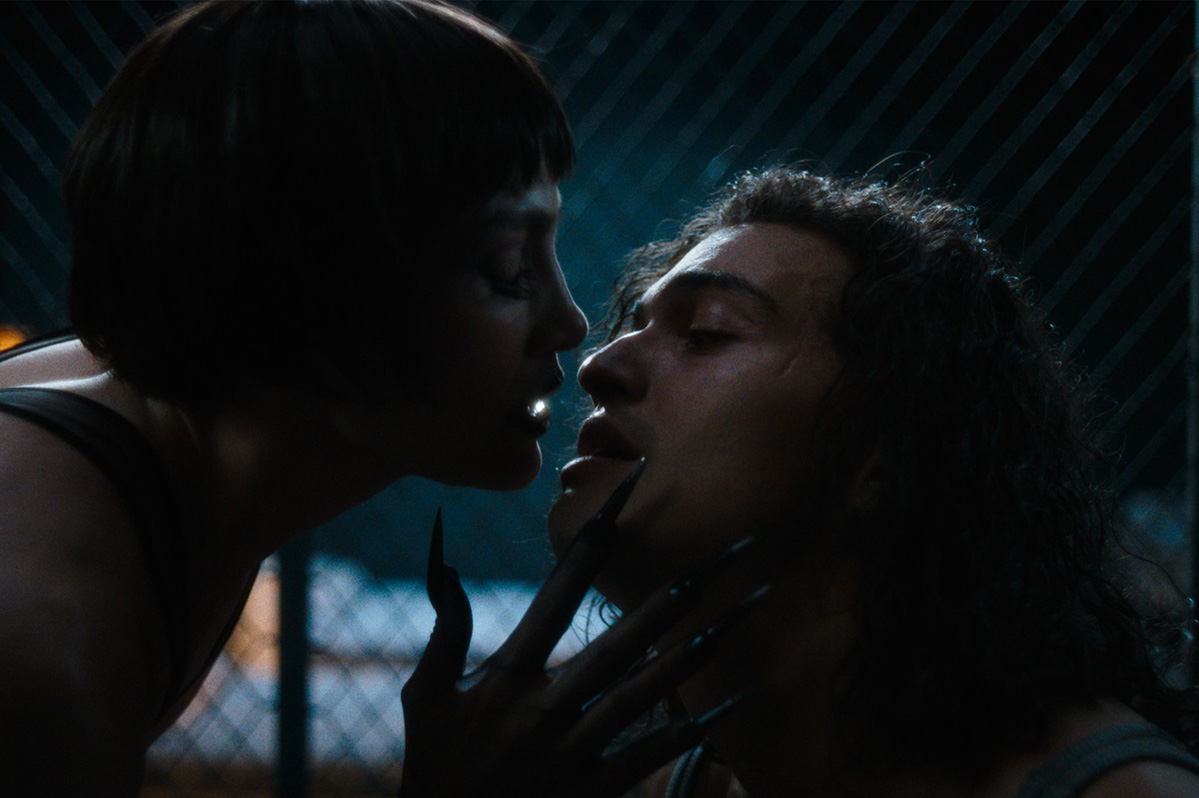
When queer Argentine author and activist Manuel Puig published his novel “El beso de la mujer araña” in 1976, it’s doubtful he could have dreamed it would one day be turned into a musical. With most of the action taking place between two characters in a cramped prison cell, and a bleak political context casting dark shadows across even its brightest moments, it didn’t exactly seem a good fit for that kind of treatment. And besides, thanks to its open depiction of queer sexuality and the overtly revolutionary tone of its political messaging, he could barely even get it published.
A decade later, it had become a major Hollywood movie, winning an Academy Award for William Hurt; it had also caught the attention of John Kander and Fred Ebb, the composing team responsible for (among other hit musicals) “Cabaret” and “Chicago,” who joined with playwright Terrence McNally to craft an adaptation for the Broadway stage. The resulting show would debut there in 1993, winning seven Tonys and a host of other awards; Puig, sadly, did not live to see it, dying in 1990 of complications from surgery after a life lived mostly in exile over his queer activism and outspoken political beliefs.
Now, the musical incarnation of “Kiss of the Spider Woman” has finally made its way to the screen, courtesy of veteran filmmaker Bill Condon – who, besides his screen adaptations of “Dreamgirls” and “Chicago,” is also responsible for “Gods and Monsters” and the “Twilight” movie franchise – and starring Latina diva Jennifer Lopez in the title role.
For those unfamiliar with the piece, whether in its musical form or any of its earlier iterations, the story centers on the relationship between two cellmates in an Argentine prison – Valentin (Diego Luna), a revolutionary being held as a political prisoner, and Molina (Tonatiuh), a queer window dresser imprisoned for “public indecency” – with very little in common and even less to talk about. Nevertheless, a connection begins to form between them when Molina decides to pass the time between them by narrating the story of his favorite movie – a glossy old Hollywood musical romance starring his most beloved Golden Age star, Ingrid Luna (Lopez) – and Valentin is drawn in despite his disdain for Molina’s trivial interests and seeming lack of political conscience. As the days pass and Molina continues his narrative in installments, their forced cohabitation begins to deepen into an unlikely friendship – and maybe more.
Of course, there are dark secrets in play, too, hidden agendas and undisclosed truths that strain their trust between each other; nevertheless, as they continue to bond, through both the escapist fantasy of Molina’s ongoing cinematic “recap” and the harsh brutalities of their shared reality, they find an intimacy that helps them transcend their perceived differences in a place designed to crush both their humanity and their hope.
In Condon’s adaptation, the stage musical is reworked to bring it closer in tone, perhaps, to Puig’s original novel, emphasizing the contrast between the grim and colorless prison cell with the spectacular glitz and larger-than-life glamor that saturate the imagined world of Molina’s recounted movie – and it’s quite a contrast. In these sequences, “Kiss of the Spider Woman” opens up its claustrophobic setting into an elaborate recreation of glossy Hollywood escapism at its Technicolor peak, full of exquisitely staged scenes of romance, action, and Golden Age MGM-level musical choreography, which also permits the film’s two male stars to spread their creative wings even further, by casting them alongside Lopez as parallel characters in the “metafilm” fantasy where so much of the story’s emotional resonance occurs – and where many of the plot details begin to reflect their “real world” circumstances as it goes along. It’s all carried off with excellence, professionalism, and technical wizardry, and the result could easily be described as cinematic “eye candy” that’s sure to please fans of the musical genre.
Yet there’s something vaguely disappointing in the choice to differentiate the two worlds of “Spider Woman” so distinctly and completely. It creates a sense of watching two separate movies that have been spliced together, one a gritty story of oppression and survival and the other the other a wild and campy exercise in nostalgic Hollywood gloss. It’s an effective enough tactic, but what it misses is the blending that happens between the two worlds in the stage production, where fantasy and reality overlap and intertwine, and we can’t help wishing that Condon had taken a more imaginative approach, one that might have translated that magical theatricality to the screen in a uniquely cinematic way.
Still, the message comes across. The story’s deeper explorations – of facing reality without sentiment or escaping it through fantasy, of bridging differences of attitude and perspective through human connection at its most basic level, and perhaps most crucially, of seeing beyond a limited understanding of sexuality and gender.
For that last point, there is no more direct reason for it than the performance of Tonatiuh. Seeing Molina embodied by a queer actor brings a level of sensitivity and truth to the mix that illuminates every other element around him. It’s a breathtaking leap toward stardom from a previously (mostly) unfamiliar performer, equally adept in the musical sequences as with the strictly dramatic material, and it elevates “Spider Woman” simply by being there.
His co-star is equally superb. Luna brings his own brand of sensitivity – and vulnerability – to Valentin; he’s also up to the demands of the musical scenes, going toe to toe with Lopez and a whole crew of dancers and seeming to enjoy every minute of it. Most important, he strikes a chemistry with Tonatiuh that makes their blossoming tenderness toward each other into the true saving grace in their character’s lives – the real world magic for which movie fantasies are only a metaphor – and lingers fondly in our memory long after the film is done.
As for Lopez, she claims the screen when she’s on it, bringing a commanding presence and a hard-working pro’s intensity to her multiple roles as Molina’s beloved actress, her character, and the sinister alter ego of the title. No, she’s not Chita Rivera (but then, who could ever be?), but she’s more than up to the challenge of bringing her own distinct energy to make the part her own.
We can’t deny that “Spider Woman,” which began its theatrical release on Oct. 10, faces an obstacle as the screen adaptation of a popular piece of musical theater; fans of the original will doubtless have expectations going in, and opinions coming out, and there’s nothing to be done about that. While it might have benefitted from a more out-of-the-box handling of the show’s dual reality, what’s important is the purity and resonance of the queer voice that comes shining through it, not just in Tonatiuh’s soulful performance but in the movie’s essential core, and that’s worth more than enough to counter any nit-picky quibbles about its overall approach.
It may not please everyone, but thanks to its remarkable lead performances and the authenticity that illuminates both its drama and its fantasy, it’s got the kind of soft power that can stay with you forever.
a&e features
Bangers and beats and bears, oh my! Tom Goss dishes on his music and the queer community
As anti-LBGTQ+ rhetoric grows louder, Tom Goss is turning up the volume on queer joy and visibility through his music and live shows
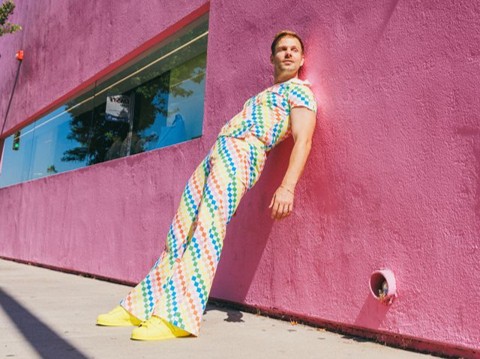
Tom Goss is making space, making an impact, and making fantastic queer-centric music as always. Through his music and his career, Goss firmly and fiercely lifts up queer joy, the more tender side of masculinity. With his genre-fluid sound that reverberates from folk to hip-hop to unquestionably and unabashedly queer pop, Goss has become a pioneer of the perfectly performed unconventional.
Most recently, he performed at LA’s iconic Hotel Café, where he shared the stage with fellow queer music icons Rachael Sage and Kristen Ford. We had the opportunity to catch up with Tom to discuss the evolution of his music, the importance of representation, and why being “very, very gay” is a radical act in and of itself.
You’ve made for yourself quite the reputation as an unabashed narrator with your music. Could you describe the evolution of your sound over the years?
For me, the story is always at the forefront of my music. Each story demands a different treatment. Folk, Pop, Dance, Hip-Hop, Rock, nothing is off the table. Whatever is best for the story is the direction that I take.
I find it a little odd that we demand our artists find their voice, but we also demand that they never change their voice. My first record came out in 2006, which was almost 20 years ago. My tastes, interests, relationships, and experiences have changed drastically over those 20 years. It makes sense that the music I make would change along with it.
Ultimately, I try to craft memorable music that is uplifting and positive. Whether that’s Gay Stuff (my July release, a gay pop summertime bop), Bear Soup (my May release, a hip-hop bear twerk anthem), or my upcoming record, which is queer Americana. It’s all a part of the journey and I hope you have as much fun as me!
Your music has graced many film soundtracks (including the full score for 2017’s Hooked), performed internationally, and has made gorgeously gay music videos. How do you approach film projects vs. live performances?
Film has pushed my idea of what style of music elevates a scene. It forces you to write differently, play instruments differently, and produce differently. As people, we tend to find the lane in which we are most comfortable, and put life on cruise control. As an artist, that is the worst possible thing. Scoring films, or making videos, forces you to work with other people, understand other perspectives and ideas, and grow as a result.
My music video “Son of a Preacher Man” was probably the first time I wrote something with the video in mind first. My director and longtime collaborator, Michael Serrato, had an idea for the “Son of a Preacher Man” music video. I thought it was awesome and went to work arranging the song in a way that would support the visuals, rather than the other way around. It was very powerful. Now I write songs with video concepts first all the time, it’s such a fun way to work!
You’re quite the celebrity in the bear community. That said, what does this recognition mean to you and how, if so, does it influence or fuel your creative process?
I feel honored to be a part of the bear community. It’s full of the most beautiful, creative, smart, and sensitive people I have ever met. Anytime I speak of love or attraction, it’s about bears. I do not understand how to love without bears. Without them, the world is black and white. With them, it is overflowing with color and joy. Love fuels everything in my life. There is no Tom Goss without bears.
Do you think labels like “bear musician” are empowering, limiting, or something else entirely?
It is not my job to label myself. I make music, I tell stories, I love those around me, and I create art as a result of that which I love. I really try to focus on those things rather than anything else.
Your music can challenge traditional (or, arguably, outdated) concepts of masculinity. Was this intentional or, rather, something that emerged over time?
It’s very intentional. I have, from the very beginning, worked to have a diverse cast of characters in my projects. I believe the way we see beauty is learned. The reason we are judgmental towards people of size, or color, or expression, is because we were taught to. That’s easy to understand.
The flipside is, the way we change the way we see beauty, is by showing other forms of beauty. That is my job. I want to take the things the world says aren’t beautiful, and capture them in a way that utilizes the same tools we use to make traditionally beautiful people appear beautiful.
I can’t tell you how many messages I’ve gotten over the years that say:
“oh, I didn’t know that I liked [insert marginally racist, sizeist, transphobic name here] but that person in your video is HOT!”
And OF COURSE THEY ARE! Stop trying to find the things you don’t like about someone and find what makes them beautiful.
Gaga has her monsters and Beyonce has her Hive. What name, either collective or plural, would you give to your devoted fanbase (assuming that one does not yet exist)?
Friends. The idea of artist idolatry makes me uncomfortable.
Can you share with us some ways that you prepare yourself for a live show? Any pre-show rituals – Pagan, Wiccan, or otherwise?
Ha! Not really. Usually I’m running around and laughing with folks until I look at my clock and realize that I need to stop and perform.
Can you share with us one lyric that you’ve written that sent chills running down your own spine?
Joan of Arc was trans as fuck.
He cut his hair and picked up arms.
Walked across an empire, fulfilled his destiny.
I play it alongside Joe Stevens, an iconic trans singer, songwriter, and multi-instrumentalist who has long been a hero of mine. Look him up. Support him.
You use your voice and your platform not just to make fantastically fabulous music but to hold a mic to queer voices and their stories. How do your roles of artist and advocate intersect and amplify each other?
I want to tell stories that other people are afraid to tell. I want to tell stories that speak to my experience and impact the way that I see the world. Over the course of my career, that has meant queer stories.
Frankly, there is no community that is more vibrant, diverse, creative, resilient, and dynamic than the queer community. It’s really that simple.
With anti-LBGTQI+ rhetoric spreading like the flames of a wildfire, do you feel a sense of urgency to advocate through your music?
My goal over the next couple of years is to be very, very gay, very, very queer, and very, very honest about the things that make me happy in that identity. We have to provide hope to people in a time when things feel so hopeless. We also have to protect our trans community. They are very much under attack.
If there is one thing that you’d wish for the younger generation of our queer community to take away from your shows, your music, and your career, what would it be?
Be yourself, no matter how hard it seems. Don’t let anyone take you away from you. It’s ok to play. Find that which brings you joy and explore it to the fullest.
You are beautiful and valuable. I’m so happy to be in this world with you.
And lastly, how will you be celebrating Halloween month this year?
I’ll be touring in California (LA, San Diego, San Francisco) and then heading to Florida for Cannonball. It’s going to be a fun, bear-filled month!
Books
New book a fun travelogue, memoir focused on cemeteries
‘Somebody is Walking on Your Grave’ takes readers around the world
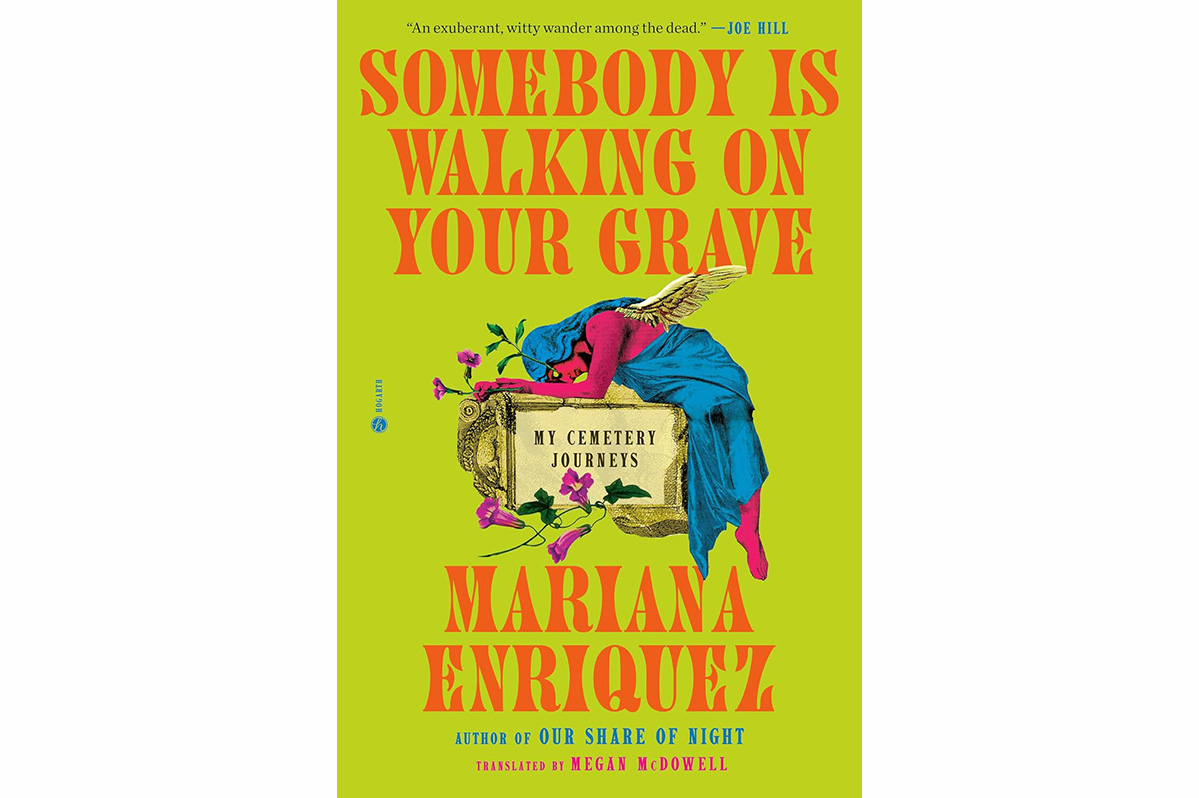
‘Somebody is Walking on Your Grave: My Cemetery Journeys’
By Mariana Enriquez, translated by Megan McDowell
c.2025, Hogarth
$30/336 pages
The knee bone’s connected to the shin bone.
You can go up from there, or down your body’s scaffolding. The backbone’s connected to the rib bone. The hip bone to the leg bone, the wrist bone to the finger bones, and in the new book “Somebody is Walking on Your Grave” by Mariana Enriquez, translated by Megan McDowell, there’ll come a day when you won’t need any of them.

She always had an appreciation for cemeteries.
Still, they weren’t an obsession until Mariana Enriquez fell head bone over heel bones in love with a street musician while on a vacation in Italy with her mother. He took Enriquez through a cemetery on their whirlwind romance, which sealed her love for graveyards.
She never seems to miss a chance to tour them, to marvel at the beauty of statuary atop marble resting places, to see tombstones listing sideways, or to note the names and tragedies of the dead. This includes the graves of non-humans, like a horse that helped its owner escape an Argentinian uprising in 1885; and a Scottish dog who guarded his owner’s grave for more than a decade.
Enriquez visited San Sebastián, Spain, and was almost jailed for it; and she was lectured about Aboriginal graves by a white man on Rottnest Island, off the Australian coast. There was a magical sense at Sara Braun Municipal Cemetery in Chile, and an absurd couple of mysteries in Argentina. She visited just some of the 42 cemeteries in New Orleans including, of course, crypts and the grave of Marie Laveau. She spent Dios de Muertos in Mexico, and was surprised that you can live near a funeral home in Savannah and not have ghosts. She visited the catacombs in France, and argued with guides and guards in several different places, noting that people are a lot nicer when they’re dead.
In a very big way, “Somebody is Walking on Your Grave” is a fun travelogue that’s also part memoir, and taphophiles will love it. But readers who specifically add a cemetery tour to their vacation itinerary, or who obsessively scour guidebooks for graveyards to visit will enjoy author Mariana Enriquez’s observations; they’re humorous and not stuffy, lightly acknowledging the bit of the macabre that’s here. She includes history behind the cities she visits, as well as for the cemeteries, and that can be a bit longish sometimes. You may not mind, though, because her descriptions enhance any trip you might make, serving as exactly what you’d want from a real live tour guide.
But toward the end of this otherwise-delightful book, Enriquez unabashedly admits to doing something atrociously unsettling, to which she says she feels no remorse – which may be a hard forgive for readers who wouldn’t ever dream of emulating it.
This book is a fun read, up to that point, so just beware. Most of “Somebody is Walking On Your Grave” is truly interesting, but that one chapter inside here may not fully allow you to wrap your head bone around it.
The Blade may receive commissions from qualifying purchases made via this post.
Out & About
Murphy’s ‘Monster’ returns for a flawed but fascinating third round
Hunnam’s Ed Gein inspired ‘Psycho,’ ‘Silence of the Lambs’
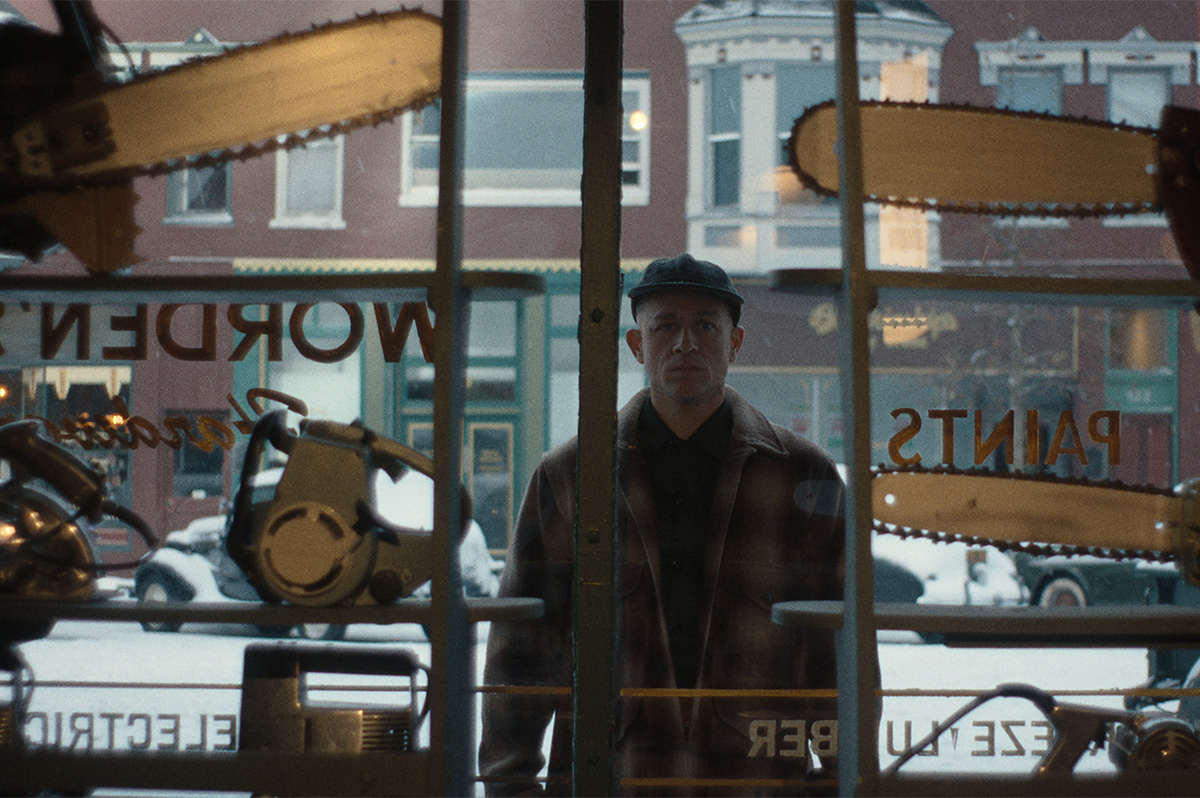
Just when you thought there were already more than enough real-life monsters on your TV screen, Ryan Murphy has served up another one.
Fortunately, unlike most of the others, this one is no longer a threat – but that doesn’t mean he’s stopped terrifying us. For the third installment of his “Monster” anthology series, Murphy profiles notorious murderer and bodysnatcher Ed Gein, whose crimes in a rural Wisconsin town during 1940s and ‘50s became legendary in the annals of serial killer lore – though, with only two confirmed murder victims, his body count barely qualifies him as one. Nevertheless, his notoriety has spread into popular culture through the inspiration they provided for some of the most iconic fictional serial killers in our popular imagination.on.
In fact, it’s the reach his heinous acts has extended through the many screen and literary villains that have been based upon him – first and most famously Norman Bates, the deranged cross-dressing killer at the center of both Robert Bloch’s novel and Alfred Hitchcock movie version of “Psycho” – which seems to be most of interest in “Monster: The Ed Gein Story,” which uses the fictionalized narrative of its titular anti-hero’s life as a springboard to explore the reflection of his crimes through the stories and the characters that would come to be based on him, as well as their impact on some of the people who created them. That’s a perfect angle for a Murphy series – in this case written by Ian Brennan and (mostly) directed by Max Winkler – because it allows plentiful opportunities to indulge the queer entertainment mogul’s penchant for campy re-enactments of true (and not-so-true) Hollywood.
In the first of its eight episodes, we meet Gein (Charlie Hunnam) in the early 1940s, living on the family farm he shares with his mother (Laurie Metcalf) and brother (Hudson Oz). As it plays out its version of the events that would shape his future madness – particularly the tyrannical ravings of his puritanically religious mother, and her efforts to instill her vitriolic hatred of sinful impulses (especially involving sex) into her sons – it also offers “fast-forward” glimpses of what’s to come for Ed, whose quiet and seemingly timid demeanor masks an inner life that includes a fascination with shrunken heads, cannibalism, and the gruesome atrocities of the Nazi Holocaust.
It’s a gripping introduction, invoking the elements of Gein’s story that would become serial killer “tropes” – the abusive upbringing, the dissociation, the gruesome “souvenirs” and skin suits intended to feed a fantasy of transformation – and lays the land ahead with the stylistic choice to blur the lines between reality, delusion, and mythology. At the same time, it quickly establishes a precedent of veering into speculation, depicting certain events – killings to which he never admitted and were never proven, a fabricated romance with a young neighbor (Suzanna Son), and other departures from the territory of “docudrama” into that of “sensationalized fantasy” – in a manner that makes it hard to separate truth from fiction.
That, of course, is the point. Most of Murphy’s crime and horror shows, in some way or another, explore that same nebulous line, whether “based on a true story” or not. The “Monster” series is an ideal vehicle for exploring the boundaries between perception and reality, offering characters and situations so distorted beyond everyday experience that even documented truths feel like part of an absurdist play. In the season’s second episode, the scope expands with the inclusion of another plotline, a few years beyond Gein’s eventual capture and imprisonment, which takes place during the filming of “Psycho,” which frames both director Alfred Hitchcock (Tom Hollander) and star Anthony Perkins (Joey Pollari) into an equally speculative exploration of the way these famous collaborators may have been affected by the artistic process of delving into Gein’s monstrous head.
We won’t go further into the events that follow during the rest of the series, except to say that it goes on to follow Gein’s presence in pop culture through his cinematic reincarnations in “The Texas Chainsaw Massacre” and “Silence of the Lambs,” and that, as with most Murphy shows, there’s a kind of lurid gloss which envelops the entire thing, a self-consciously elevated style that magnifies half-truths and popular mythology alongside the tragedies that sparked them.
That, historically speaking, has always been the controversy around Murphy’s “Monster” shows, sparking debate about exploiting the memory of victims for the glamorization of their killers. It’s also the same controversy that has surrounded all such stories in popular entertainment culture, whether partially true or entirely fabricated. Indeed, Hitchcock faced similar criticism with “Psycho” all those years ago, yet he also made a fortune and cemented an already-impressive legacy with a movie that redefined not just the horror genre, but the boundaries of popular cinema itself; and though (as the series suggests) he may have come to regret opening a “Pandora’s Box” of previously unseen violence and depravity that would saturate the big screen forever after, he would, no doubt, have appreciated the irony of seeing himself portrayed here as a creature driven perhaps by some of the same twisted desires as Gein – simply because he understood, as a master manipulator of audiences, that the most effective use of filmed storytelling is achieved by showing us the darker corners of our own inner landscapes that we would otherwise prefer to ignore.
In terms of presentation and performance, “The Ed Gein Story” successfully inhabits a gritty noir-ish space that evokes both the pulpy true crime stories of Gein’s day and the “slasher movie” aesthetic of our own; the violence is no-holds-barred, and therefore difficult to watch, which in itself will likely be enough to ensure that it’s not a show for every taste. Though Hunnam is disappointing as Gein (his affected, one-note take on the character is a far cry from Perkins’ endearingly awkward boyishness as the real-life killer’s fictional stand-in in “Psycho”), but many of the other cast members deliver outstanding turns – most notably the gifted Metcalf, who makes Gein’s mother arguably more monstrous than her notorious offspring.
Ultimately, appreciation for Murphy’s newest foray into true crime myth-making will come down to, as with any of the others, a matter of taste. Those who approach it with an eye toward its canny examination of popular media’s obsession with crime, violence, and unspeakable horror might have a better time with it than those hoping for a more objective, centered, and fact-based document of Gein’s notorious history.
In any case, its entertainment appeal is – perhaps ironically – undeniable; after all, serial killers provide an almost ironclad guarantee of public interest, carrying the ever-mysterious key to what makes a person “evil” and the chance to examine our own relationship with the deadly impulses behind their crimes. Whether or not you appreciate the show’s deliberately exploitative tone, or the sometimes over-the-top camp of its lurid presentation, or even the seemingly gratuitous nudity and violence that serves to uncomfortably titillate us throughout, you’re bound to be drawn in.
In other words, you might not like it, but you won’t be able to look away.
a&e features
Jennifer Lopez talks ‘Kiss of the Spider Woman,’ queer representation
Latest version of iconic story ‘a love letter to humanity’
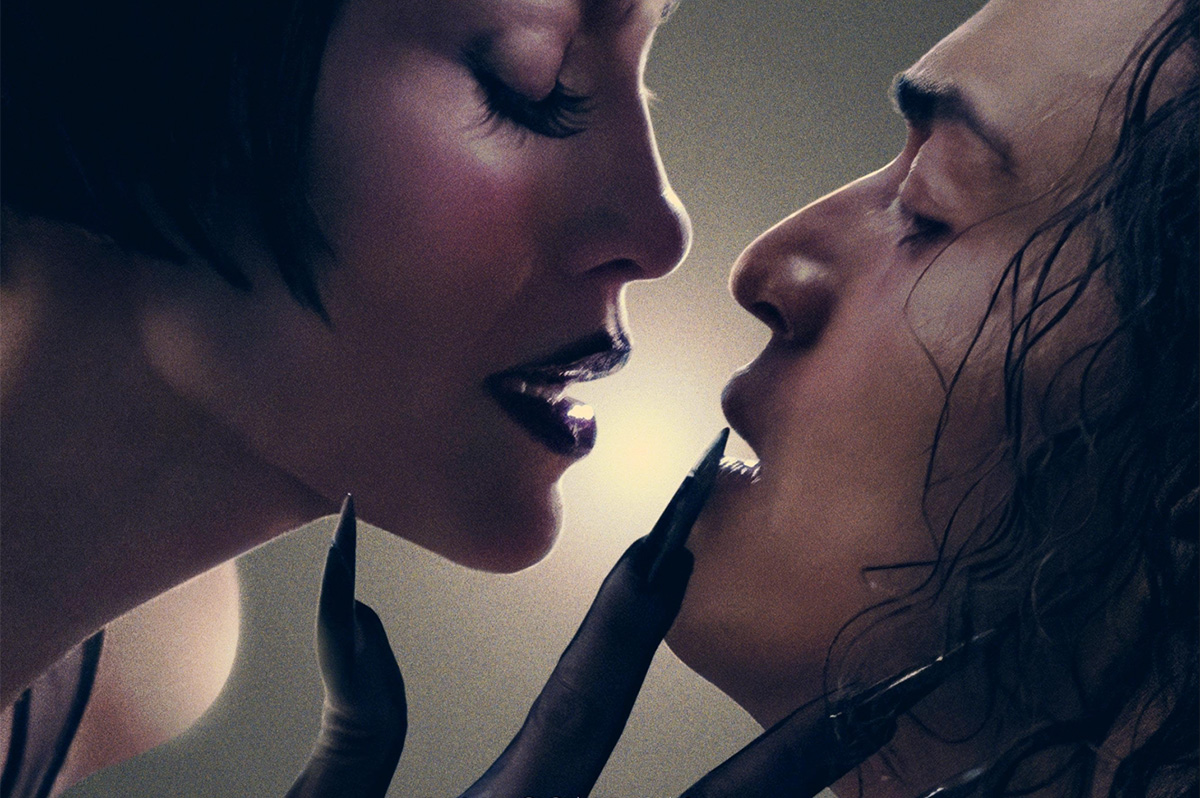
With its riveting storyline and gorgeous dance scenes, it’s no wonder that one of the standout films this awards season is “Kiss of the Spider Woman.” Originally a bold novel published by Argentine writer Manuel Puig in 1976, it was adapted into a play and then a screenplay. In 1985, the film earned four Academy Award nominations, with William Hurt winning Best Actor — the first ever awarded for a portrayal of an openly queer character.
Ten years later, in 1993, the story was turned into a Broadway musical starring the iconic Chita Rivera, and won several Tony Awards. Fast forward to 2025: for this new version, Jennifer Lopez and Diego Luna both play dual roles in the film, which also stars newcomer, Tonatiuh.
The film takes place in 1983, during Argentina’s troubled times; two prisoners are forced to share a confined cell in Buenos Aires. Valentín (Luna), a Marxist revolutionary, is committed to his political idealology, despite being tortured and deprived by the guards. Molina (Tonatiuh), a gay window dresser who is in jail because of his sexual orientation, survives the insanity by fantasizing about his favorite movie, telling Valentin all the details. While their connection begins as a way for them to emotionally escape, it grows deeper, in the most profound way.
Through stories, confessions, and sacrifice, the duo discover unexpected tenderness and the possibility of love in a place designed to annihilate the human spirit.
“These two men who could not be different in every single way, everything is stripped away from them in their lives, the politics, class, education, all this stuff goes away, and they start to see themselves as individuals,” said Bill Condon, the Academy Award-winning writer-director known for such films as “Gods and Monsters,” “Chicago,” “Dreamgirls” and “Beauty and the Beast,” who was deeply moved as he wrote the script.
Producing the updated version of the film was vital to Lopez, who is also an executive producer. “I think it’s more relevant than ever,” she said at a recent Golden Globes press event.
“The idea of a trans or gay character in this movie…the kind of divisiveness that we’ve experienced in the world in the past few years. A story about two people who are thrown together, who are so opposite, who are so different from each other. And find the humanity and fall in love with each other. Who would never probably even find themselves in the same circles. That’s really important to have queer representation in movies. In my own family, I know how important that is for people to see that.”
Tonatiuh, who steals every scene he is in, lost 45 pounds for the role.
“I think there’s a certain moment that’s happening right now that we need to remind ourselves that dignity and humanity and love transcend gender,” he said. “They transcend sexual orientation. They transcend all of those things. And so, yes, we deal with queer themes in our film, but I do think that it is a love letter to diversity. It is a love letter to humanity as a whole.”
Condon loved every version of “Kiss of the Spider Woman,” each of them was “revolutionary” for its time.
“But when you read that novel, it’s taken us this long to really catch up to what it was saying. And specifically, this was well before the election season and well before we knew what was going to happen. But it was clear that trans people were going to be demonized, that they were going to be a part of the conversation…it did feel that this was something that was bubbling up and happening. So that’s what made it feel very urgent.”
Lopez added: “The revolution that you’re saying that we need right now is exactly the reason why I think the movie is so important right now for people to see. Because it reminds you that it’s really, at the end of the day, about two people getting along and falling in love, when you really forget about all of the other things, that we’re all just human. And it is about humanity.”
Tonatiuh hopes that the film inspires people to step up.
“We constantly see the news, we see everything that’s going around and we wonder, ‘What is it that I can do? I’m just one person.’ But this isolationist mentality is the thing that gets us here. Every one of us has little actions to take and little moments to do. And especially in a moment where Latinos in general in this country are experiencing massive negative public relations, just attack after attack after attack, it’s really wonderful to showcase what Latino dignity is and reminding people of, like the talent, the joy that our culture adds to the United States and the world.”
Events
“Butterflies are free. Humans deserve to be free too.” Queerceañera honors local queer Latine community
The L.A. LGBT Center’s annual event centered queer Latine art, resources and resilience
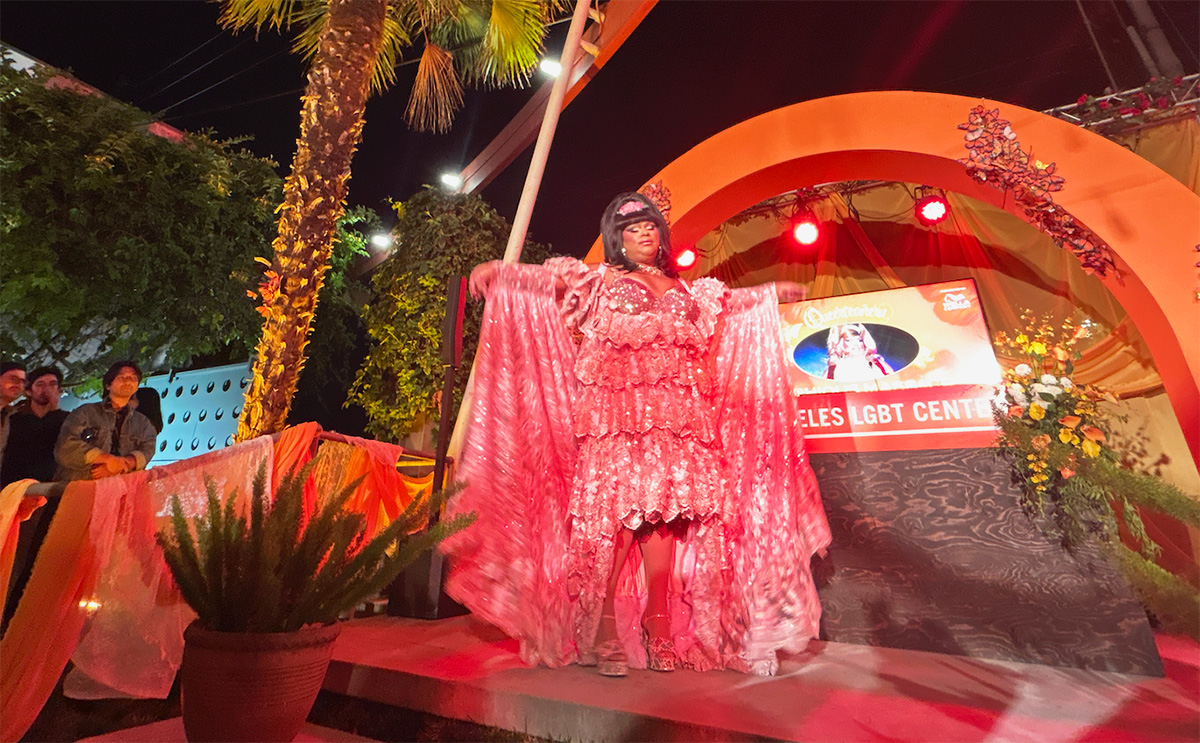
On Friday night, rainbow-dyed cloth, butterflies, balloons, and flowers surrounded drag queen Lushious Massacr as she fluttered across a stage, her bedazzled, princess-like dress cascading behind her in hot-pink waves. The crowd stood enchanted as she lip-synched along to her baile de sorpresa: a surprise dance performed by a young girl for loved ones attending her 15th birthday celebration.
It is Lushious’s birthday — but she is turning 37. Nearly two decades later, she is celebrating the quinceañera she never got to have. “When I was a little boy, I never could have imagined a world where I would be allowed to celebrate my quinceañera. The majority of people were still very allergic to queerness,” Lushious told the crowd. “Tonight, we will celebrate the little girl inside of us. She wasn’t allowed, and she wasn’t given permission. The little girl will be given permission tonight.”
This reclamation and queering of tradition was a recurring theme at the Los Angeles LGBT Center’s annual Queerceañera, also known as Queerce. The event provides a space for queer Latine community members to dance, be connected to resources and support, and embrace themselves in the company of loved ones, chosen family, friends, and fellow queer strangers alike. This year’s Queerce, themed “Mariposas Sin Fronteras,” or Butterflies without Borders, forged a cocoon that allowed guests to steep in the comfort of acceptance and liberation. This respite, though lasting only a few hours, is for many queer people a necessary safe haven in an increasingly tumultuous political and social landscape.
“This year has been so heavily marked by attacks on immigrant communities, attacks on the Latine community, specifically in Los Angeles,” Los Angeles LGBT Center Chief Equity Officer Giovanna Fischer told the Blade. “Our work’s directly impacted by that, because we serve a lot of the Latine community in Los Angeles…We’re seeing an uptick in people accessing our immigration and legal services. So, how do we take this event that is celebratory and will remain celebratory in nature, to still be responsive to what our community is going through?”
Resource tables dotted the courtyard at the center’s plaza, where Queerce took place, and offered various bilingual pamphlets on sexual health, legal advocacy, Know Your Rights resources, as well as connections to Mi Centro: a Boyle Heights community center formed in collaboration with the Latino Equality Alliance that provides HIV testing, a food pantry, outreach events, mental health support, legal services and other programs.
Fischer also discussed that the Center’s staff members have been trained on how to respond to United States Immigration and Customs Enforcement (ICE) officers as raids and operations continue to take place across Los Angeles. This training is part of organizational efforts to increase community safety as spaces — especially LGBTQ+ Latine ones — come under close political scrutiny and threat.
One of Queerce’s honorees, Oliver Alpuche, stressed the importance of preserving these spaces. A decade ago, he founded the non-profit DTLA Proud to organize festivals, block parties, and marketplaces that uplift queer identity and celebration. In a tearful speech, Alpuche stated that queer spaces are in “trouble.” They are places “where we gather, we plan, we protest, [and] we celebrate,” Alpuche said on Friday night. “We need to keep them alive. And my commitment going forward is to create a Rainbow District in Downtown where we are all accepted, where our culture could meet our queerness and thrive in a space where representation matters.”
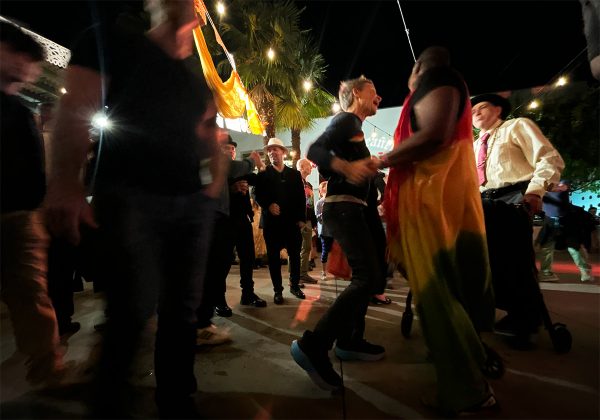
Queer Latine representation shone brightly at the event, with electric reggaeton remixes spun by DJ Bella Spreads and a tender art show by multimedia installation artist Yulissa Mendoza. The show was comprised of two works: “¿Eres de la ciudad o del rancho?” and “Siéntate, Mi Amor,” the latter of which was displayed at the Cheech Marin Center for Chicano Arts and Culture in 2024. A tangible, interactive piece, “Siéntate, Mi Amor,” features a table modeled after the one at Mendoza’s grandmother’s home. Covered with a delicate crochet tablecloth, it was adorned with keepsakes, like a lightly crumpled sleeve of Marie biscuits, a note with a gas bill neatly scribed on it, and another that said: “Love you.”
“It’s almost a universal table of sorts,” Mendoza said, recounting to the Blade about how, as a child, sitting at a communal table felt endless and boring. It wasn’t until they had developed close queer friendships and a deeper understanding of their own identity in adulthood — much of which happened around a table — that they began to rethink what this early experience meant to them. “I think it was really my chosen family that allowed me to see the spaces that I grew up in as formative and important…My art now is me honing in on those cultural traditions and practices, [and to] showcase them in a way that is not only archiving them, but making them something of my own.”
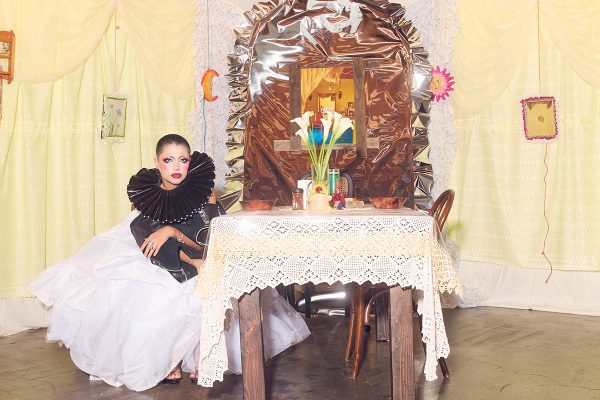
Their work speaks to the practice of art as transformation — how historical and familial ties can be strengthened through a different kind of perspective: one that holds a deep kind of self-knowledge. Here, art is time travel. Art allowed Mendoza to form new branches from early, misunderstood roots. Deeply informed by their relationships to their queerness and their Latine heritage, Mendoza has created a new kind of space that is both familiar and totally new. They are creating a different pathway and gathering ground illuminated by queer imagination, and the melding of both past and future.
As community members gathered for Queerce, a question lingered in the air: what does an expansive and safe future look like? While there may not be a clear, definitive answer, events like these highlight the efforts, resilience and solidarity that power marginalized, queer communities. “You think butterflies listen to anyone who tries to tell them when they can or cannot fly? Butterflies are free. Humans deserve to be free too!” Lushious Massacr said. “In a world that demands that queer people hide, we refuse. In a country that demands that immigrants run and hide in fear, we refuse. We will not be afraid, and we will not ask for permission to live our lives.”
Celebrity News
Lesbian comedian who performed in Saudi Arabia apologizes
Jessica Kirson invited to participate in Riyadh Comedy Festival
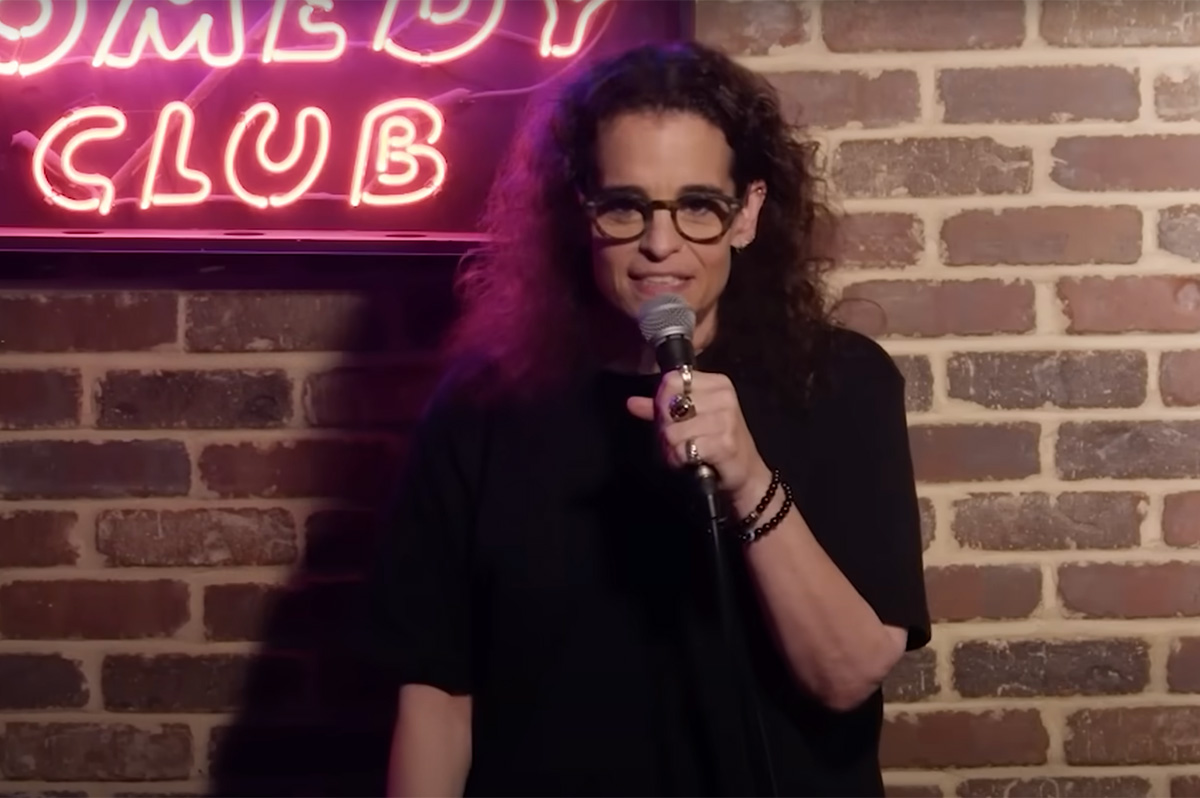
A lesbian comedian who performed at a comedy festival in Saudi Arabia has apologized.
Jessica Kirson joined Dave Chappelle, Pete Davidson, and dozens of other comedians who participated in the Riyadh Comedy Festival that began in the Saudi capital on Sept. 26 and is scheduled to end on Thursday.
Kirson performed on Sept. 29.
Saudi Arabia is among the countries in which consensual same-sex sexual relations remain punishable by death.
A U.S. intelligence report concluded Saudi Crown Prince Mohammed bin Salman “likely approved” the murder of Jamal Khashoggi, a Washington Post columnist, inside the Saudi Consulate in Istanbul in 2018. The Saudi government has also faced criticism over the treatment of women, migrant workers, and other groups in the country.
“On Sept. 29, I performed at the Riyadh Comedy Festival. This decision has weighed heavily on my heart ever since,” said Kirson in an exclusive statement to The Hollywood Reporter. “I like to express my sincere regret for having performed under a government that continues to violate fundamental human rights.”
She said she was “surprised” as “an openly gay person” to receive an invitation to perform at the comedy festival.
“I requested a guarantee that I could be openly out as a lesbian on stage and perform gay material. I hoped that this could help LGBTQ+ people in Saudi Arabia feel seen and valued,” said Kirson. “I am grateful that I was able to do precisely that — to my knowledge, I am the first openly gay comic to talk about it on stage in Saudi Arabia. I received messages from attendees sharing how much it meant to them to participate in a gay-affirming event. At the same time, I deeply regret participating under the auspices of the Saudi government.”
Kirson in her statement to THR said she “donated the entirety of what I was paid to perform there to a human rights organization.”
She did not say how much the comedy festivals paid her, or the group to which she donated her fee.
“I made this decision because I want that money to go to an organization that can help combat these severe issues,” said Kirson.
THR notes Marc Maron, David Cross, and Atsuko Okatsuka are among the comedians who criticized the festival. Kirson in her statement said she respects her “fellow comics who have spoken out against” it.
“I recognize the concerns and criticism this has raised. I hope that this moment sparks dialogue about how we can use our platforms for good — to support people without a voice and to find ways to be less divided,” she said. “In the past, I’ve faced criticism for choices I’ve made, both on and off stage, and I rarely responded. This time, I felt I needed to speak up. I could not remain silent.”
Kirson ended her statement with an apology to her fans and others she has “hurt or disappointed.”
“I have a special relationship with my fans because of the vulnerable nature of my comedy and the trust they place in me as part of the queer community,” she said. “To my fans: I see you. I hear you. Your voice matters to me. I love you all, and I am genuinely sorry for making a poor decision that had repercussions I didn’t fully consider. I will take full responsibility for my actions and dedicate myself to making amends, so that my words and choices reflect the respect and care you deserve.”
The 2034 World Cup will take place in Saudi Arabia.
Qatar, which borders Saudi Arabia, hosted the 2022 World Cup. Consensual same-sex sexual relations remain punishable by death in the Middle East country.
President Donald Trump in May visited Qatar, Saudi Arabia, and the United Arab Emirates.
Events
The Los Angeles Blade Partners with AJSOCAL to host gala uplifting AAPI joy and resistance
AJSOCAL is hosting its annual gala at the Westin Bonaventure Hotel on Thursday, October 16th; Los Angeles Blade serves as Gala Media Partner.
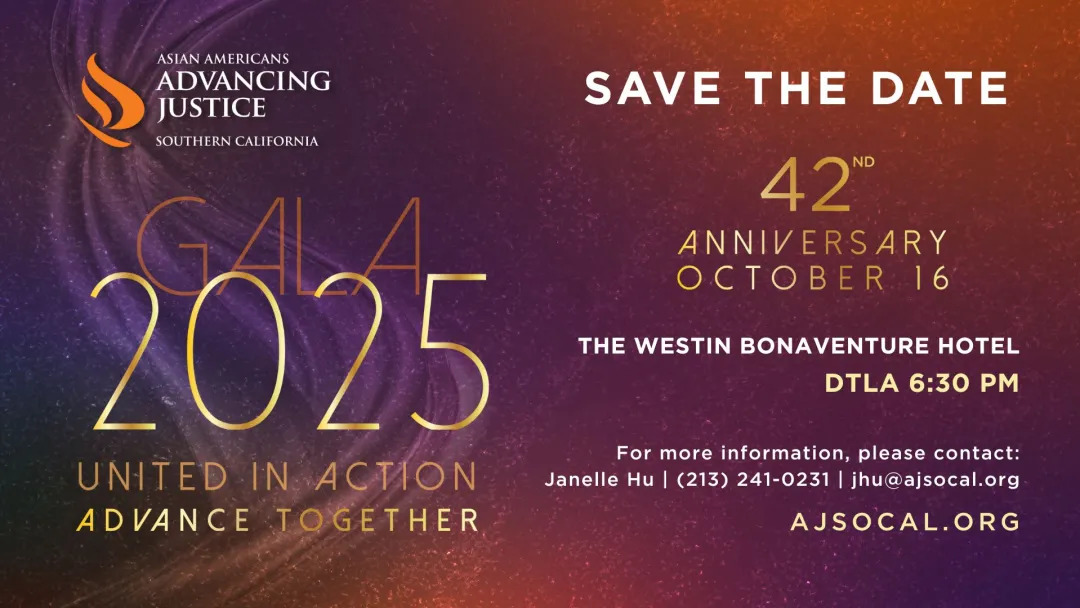
This year, Asian Americans Advancing Justice Southern California (AJSOCAL), a leading legal and civil rights organization that fights for policies defending Asian American and Pacific Islander community members, is hosting its annual gala at the Westin Bonaventure Hotel on Thursday, October 16th. The Los Angeles Blade serves as the organization’s 2025 Gala Media Partner, spotlighting feature issues on two LGBTQ+ policy advocates who have spearheaded the organization’s AAPI Queer Joy coalition as well as one of the event’s honorees, first-time Los Angeles City councilmember Ysabel Jurado.
A special edition run of these features, as well as other Los Angeles Blade stories, will be available at the gala. Other honorees and special guests at this year’s event include Bird Marella’s managing partner, Paul Chan, Pasadena Fire Department fire engineer Chien Yu, former Biden cabinet secretary Julie Su, and others. The gala will be hosted by anchor and broadcast journalist David Ono and will feature a performance by local band Kokoro.
L.A. City Councilmember Ysabel Jurado will be presented with the 2025 Trailblazer in Justice Award, celebrating those who break barriers, open doors, and pave new paths, by the Los Angeles Blade and AJSOCAL.
More information can be found here.
WHERE: The Westin Bonaventure Hotel – Downtown LA
404 S Figueroa Street
Los Angeles, CA 90071
WHEN: Thursday, October 16
4:30 pm Media Check-in
5:15 pm Red Carpet Opens
6:30 pm Event Begins
6:45-9:00 pm Program and Dancing
Asian Americans Advancing Justice Southern California (AJSOCAL) is the nation’s largest legal and civil rights organization for Asian Americans and Pacific Islanders (AAPIs). Founded in 1983, AJSOCAL supports over 15,000 individuals and organizations annually. By offering free legal help, engaging in impact litigation, conducting crucial research, and advocating for policy change, AJSOCAL prioritizes the most vulnerable members of AAPI communities while fostering a robust advocacy for civil rights and social justice. Offices are in downtown Los Angeles and Orange County, with satellite offices in Sacramento, ensuring accessibility for
all.
Events
“We are glimmers of hope”: LGBTQ+ advocates deliver powerful speeches defending queer rights at Equality Awards
The 2025 Equality Awards honorees were Fran Drescher and the Coalition for Humane Immigrant Rights
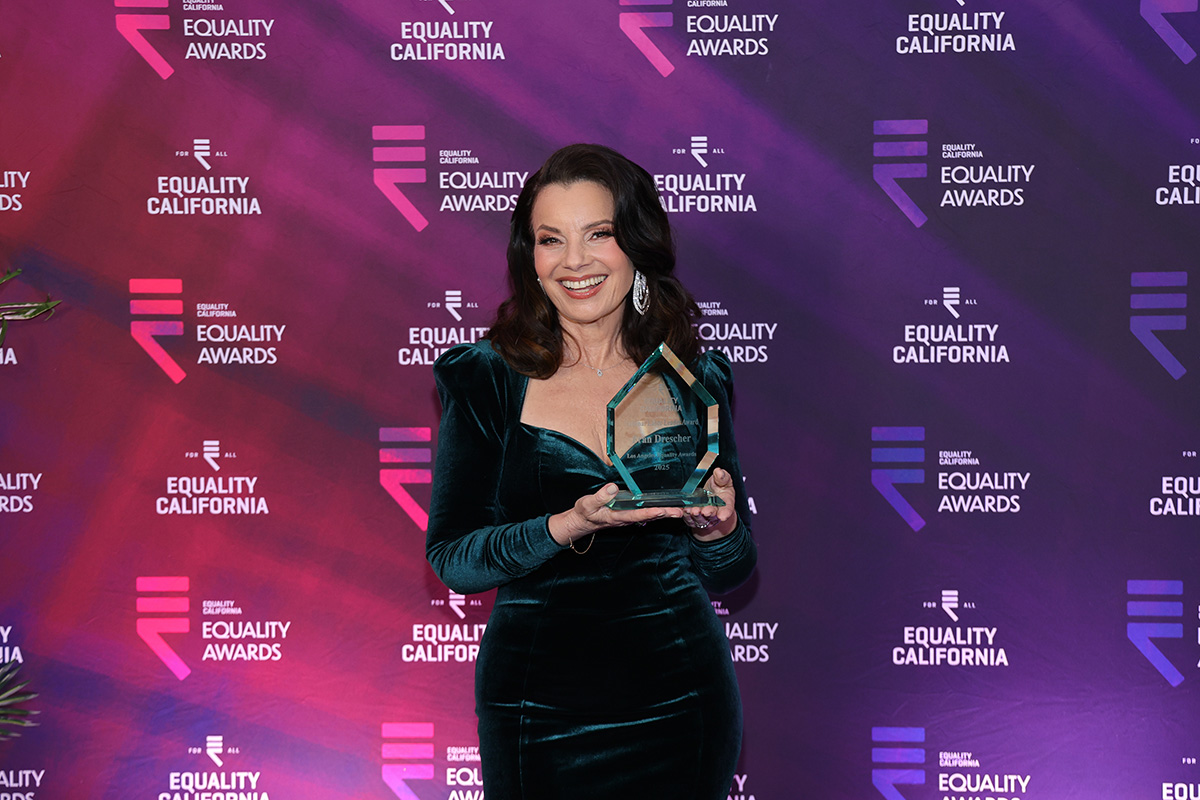
On Saturday evening, nearly 700 people packed the lower-level ballroom of the lavish Fairmont Century Plaza hotel for LGBTQ+ civil rights organization Equality California’s annual awards ceremony. Throughout the night, several speakers took passionate stands on the urgent and unequivocal need, now more than ever, to support queer communities and the organizations working to protect their rights and liberties. Senator Lena Gonzalez and Assemblymember Mark Gonzalez, two of the event’s co-chairs, encouraged attendees to create a direct impact by making donations. The goal for the evening was $125,000.
As soft pink light and the clinking of cutlery at dinnertime enveloped the room, host Bob the Drag Queen wove lightness and humor in between speeches with his signature biting humor and commanding stage presence. “I do a lot of galas, so sometimes they kind of bleed together,” he told the Blade. “But it’s never lost to me: the work that is being done at these things and the people whose lives are being helped. Sometimes it’s easy to get lost in the rigmarole of, ‘Oh, another gala. More rich people giving money.’ But then that money does end up going somewhere and doing something really substantial.”
Around half an hour into the program, Equality California’s executive director, Tony Hoang, delivered, without hesitation, a promise that the organization is dedicated to resisting and unraveling the harm of the administration’s threats to policies and programs that support queer and trans youth, immigrants, and other community members. “The courts will not save us. Congress will not save us. What will save us is sustained organizing, day in and day out,” Hoang said. “While they’re trying to silence us, this is the moment to double down, to share your story, to invest your time, to invest your resources.”
Comedian and radio host Jesse Thorn also took the stage to speak candidly about raising trans kids and how exhausting this last year has been. When his first child came out as trans almost ten years ago, he feared for her safety, but was introduced to various resources, support groups, and care options that gave him hope as a parent. “It felt like we were on a steady path to safety,” he said. “I only wish that I still had that safe, optimistic feeling. Right now, I just feel sick to my stomach.”
Thorn recounted trying to shield one of his children from a transphobic commercial that came on during a 49ers game he’d been watching, and how, more recently, he was told that the clinic that provided gender-affirming care to his children was shuttering. “Do we fight? Do we run away and hide? Are we traumatizing our kids if they know the stakes?” he said. “If we reply to someone’s post on Facebook with the name of our new doctor, will someone turn them into the feds?”
While it feels like he and his wife have had to make a new call every day to recalculate next steps for their family, he finds comfort in thinking about queer and trans family members, friends, and elders who resisted systemic violence and fought for their right to stability, equality, and happiness. “[I] think of all these people that gave so much of themselves to live a joyful life,” Thorn told the Blade. “It’s the readiness, the lack of hesitance that I have felt from not just the queer community more broadly, but particularly those earlier generations. They see the analogy is direct, and they’re fighting.”
Other notable speeches of the night included one of the evening’s two honorees: actress, former SAG-AFTRA union president, and 90’s sitcom icon Fran Drescher. As she shimmied onto the stage with a wide smile to accept the National Labor Leader Award, she cracked jokes before honing in on the importance of defending the lives of marginalized people. She spoke about the successful strikes she led at SAG-AFTRA, which led to historic negotiation deals in favor of the union’s workers, as well as her own battles with misogyny as she took on leadership roles later in her career. “I can lead with intellect and empathy and wisdom — and I can still rock a red lip!” she declared.
“As members of a labor union or citizens of a nation, it behooves us all to resist these manipulations, to make kindness and compassion our compass, to remain stalwart in our unity above all else,” Drescher concluded. “I’ll just close by saying this: love is love. Thank you.”
The other honoree of the evening was the Coalition of Humane Immigrant Rights (CHIRLA), an organization that has been paving the way in developing programs, initiatives, and rallies to advance civil rights for immigrant communities. CHIRLA’s executive director, Angelica Salas, who has led the group for over 20 years, accepted the ceremony’s Community Leadership Award and addressed the crowd with empowering remarks.
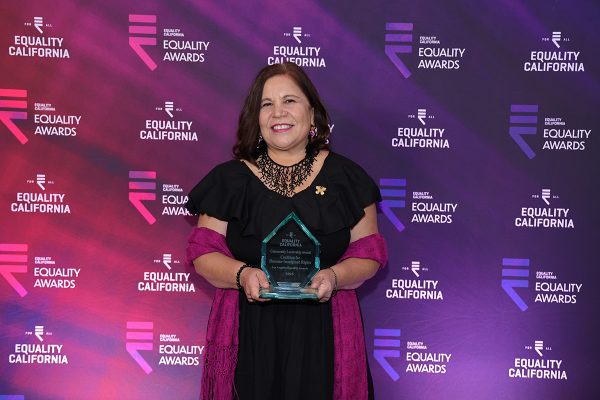
Off the heels of a march protesting the administration’s executive orders, which have authorized unjust arrests and detainments of immigrants, Salas was clear in her criticisms and calls to action. “We want ICE out of our schools. [We want] ICE out of our clinics and hospitals,” Salas said. “Like it or not, our LGBTQ+ Americans and immigrants make this country more beautiful, more powerful, and more united…We are rainbows, we are color, we are glimmers of hope…Equality California, we got your back, and I know you got our back. So, let’s fight together.”
As the night wound to an end, several items were fought over during an energetic live auction, including vacation getaways to Paris and Puerto Vallarta, a Sabrina Carpenter concert experience, and memorabilia associated with late activist Marsha P. Johnson. By 9:30 p.m., the $125,000 donation goal was achieved and even surpassed by over $5,000.
Movies
Intensive ‘Riefenstahl’ doc dives deep into a life of denial
German filmmaker spent decades trying to rehab her image
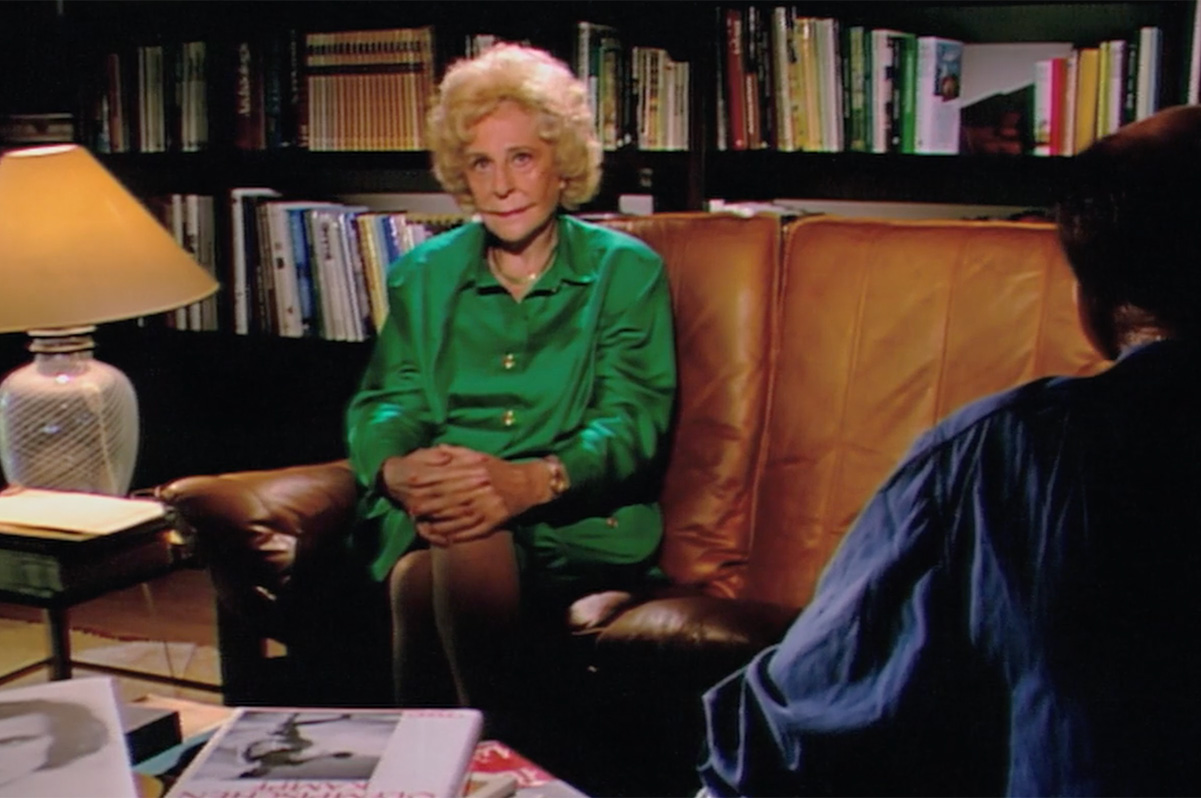
She was an exceptional woman of the early 20th century, an ambitious powerhouse with beauty, intelligence, and a bold creative vision, along with a determination for success that helped her become a pioneering female artist. She rose to prominence as a dancer, actress, photographer, and filmmaker who helped to define the aesthetic of an era, and reached the top of her profession in a male-controlled industry. Her career was relatively short, but her life was long enough to see her movies held up as cinema masterworks, studied by filmmakers and scholars for their blend of technical prowess and poetic vision, before eventually dying at the impressive age of 101 in 2003.
Yet today, you’d be hard-pressed to find anyone eager to celebrate her legacy with anything more than carefully calculated appreciation.
That’s because her name was Leni Riefenstahl, and her filmmaking career ended prematurely not in retirement, nor from illness, nor even because of some scandalous gossip-column tale of adultery or sexual deviance. It ended because she built it in Germany, collaborating with Hitler and hob-nobbing with a who’s-who of infamous Nazis while enthusiastically creating spectacular documentaries that implicitly promoted a romanticized vision of the Third Reich. Her celebrated films were tarnished at the end of the war, their artistic merit eclipsed by the circumstances under which she had made them, and she spent much of the rest of her life as a relative pariah.
Indeed, as the cinema buffs out there probably already know, her name became practically synonymous with the idea of an artist whose work cannot be separated from their “problematic” ethical choices or political views; and while she would resurface when her films found muted-but-sincere appreciation from a new generation of critics, participating in interviews or appearing on the occasional talk show, she would spend the rest of her long life trying desperately to rehabilitate her image and her reputation in the public eye. Yet however often she repeated her claims – that she had never believed in the ideals of the Nazi movement, that she was never aware of the atrocities that took place under Hitler’s reign, that she had always only been motivated by “art” – most of the world seemed to never quite believe them.
Now, with an exceptionally comprehensive documentary from director Andres Veiel, Riefenstahl’s culpability in the Holocaust is up for examination again, and the timing couldn’t be any more perfect.
Granted unlimited access to Riefenstahl’s personal archives by her estate, Veiel draws deeply from the rich collection of imagery, writings, and artifacts contained there to assemble a measured and methodical portrait that is largely drawn from her own words and the pictographic record she chose to keep as part of her official legacy. Tracing her from her upbringing as the child of a stern authoritarian father and a mother who pushed her aggressively to succeed, it follows her rise in the German movie industry, where she gained fame as an actress before making her own first film as a director – “The Blue Light” (1932), a successful debut that caught the attention of Germany’s future führer, eventually leading to her first commission as a filmmaker for the Nazi government.
It goes on to examine the records of her associations with the Nazis during the wartime years, including an implied affair with Joseph Goebbels and an eventual marriage to a leading Wehrmacht officer, as well as a friendship with Nazi architect Albert Speer that would endure beyond his 20-year post-war prison sentence. Even more provocative, it explores her participation in the filming of location scenes for a propaganda film that used child inmates from a nearby concentration camp as extras – something that casts her claimed ignorance of the Nazi agenda in an even less convincing light.
It also utilizes the copious material that documents her lesser-known history after the war, during which she undertook the writing of her memoirs and returned – briefly – to the limelight with an extensive photographic study of the Nuba tribes of Sudan. But it’s her frustrated attempts to escape the stain of her past that provides the recurring theme for this portion of her life, punctuated by footage of her confrontations with interviewers, talk show hosts, and documentarians who asked her the questions she didn’t want to answer. In these moments, we can witness her unfiltered; we take note of her imperious manner and her quick temper, of the vanity which shows through her demands over lighting and makeup, and of the tongue-slips that inadvertently offer a glimpse at something we suspect she’d rather we didn’t see.
Veiel organizes all this information in a sort of kaleidoscopic narrative in which the various periods of his subject’s life bleed across and into each other, forming recognizable patterns which acknowledge and revel in her singular artistic vision, yet come to form an inescapably damning assessment of her long-held denials; though there’s no “smoking gun” that proves her unequivocally to be a liar, there are far too many of those “tongue-slips” to ignore. In the end, it leaves us with the inescapable conclusion that Leni Riefenstahl, whether she believed in the party agenda or not, was willing – at best – to overlook Hitler’s monstrous crimes against humanity for the sake of her own ambitions; even more, it suggests that the only thing she regretted afterward was the loss of her career and the stigma that was steeped upon her. In the end, it’s hard to avoid the conclusion that she, like so many Germans of the Nazi era, wanted to simply pretend they didn’t know what was happening, when they were tacitly condoning it every step of the way.
With its leisurely pace and its brooding, minimalistic score by Freya Arde, “Riefenstahl” weaves a hypnotic effect that makes its two-hour runtime drift by like a dream, but there’s a meticulous logic and a rigorous empiricism to it all – marked by a sparseness of narration from its director, who merely supplies essential context to material he allows to speak for itself – that crystalizes the facts in way that’s entirely rational, and leaves us with an ominous feeling of familiarity with the world in which its controversial subject made her contribution to cinematic history; it’s this which renders Veiel’s documentary with such a profound sense of relevance, an ominous feeling of déjà vu that might be best illuminated through Riefenstahl’s own words from the final recorded conversation included in the film, in which she predicts that it will take “one or two generations” for Germany to reawaken to the “morality, decency, and virtue” to which its people are “predestined.”
Doing the math, her calculations feel chillingly accurate, though perhaps the spirit that has reawakened has more to do with a particular worldview than a specific national identity.
“Riefenstahl” premiered at the Venice film festival in 2024, with an American debut at Telluride earlier this year. Released in New York and screening at venues across the U.S. and Canada this fall, it’s a movie to watch for. Set your radar accordingly.
-
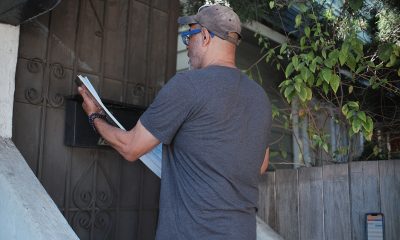
 West Hollywood3 days ago
West Hollywood3 days agoAdvocates, councilmembers and students are mobilizing for Prop 50 around the city
-

 Los Angeles1 day ago
Los Angeles1 day agoL.A. County Supervisors vote to declare local emergency in support of immigrant community members
-
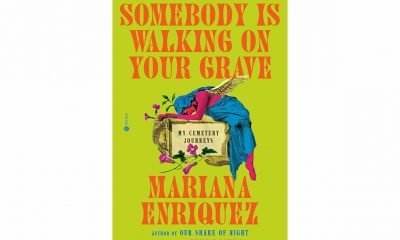
 Books4 days ago
Books4 days agoNew book a fun travelogue, memoir focused on cemeteries
-

 Movies5 hours ago
Movies5 hours agoBreakthrough queer performance makes for a memorable ‘Kiss’
-
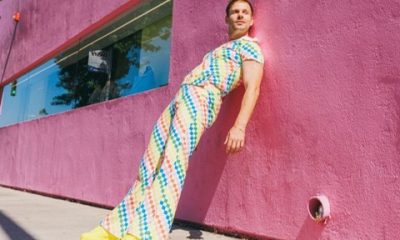
 a&e features2 days ago
a&e features2 days agoBangers and beats and bears, oh my! Tom Goss dishes on his music and the queer community
-
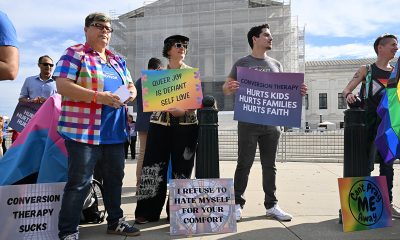
 opinions5 hours ago
opinions5 hours agoOn free speech and the harms of conversion therapy
-
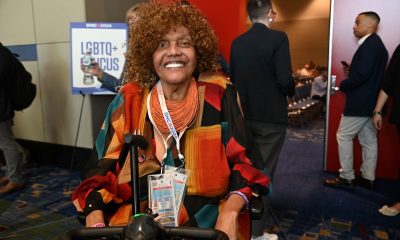
 National1 day ago
National1 day agoTrans rights activist Miss Major Griffin-Gracy dies at 78

